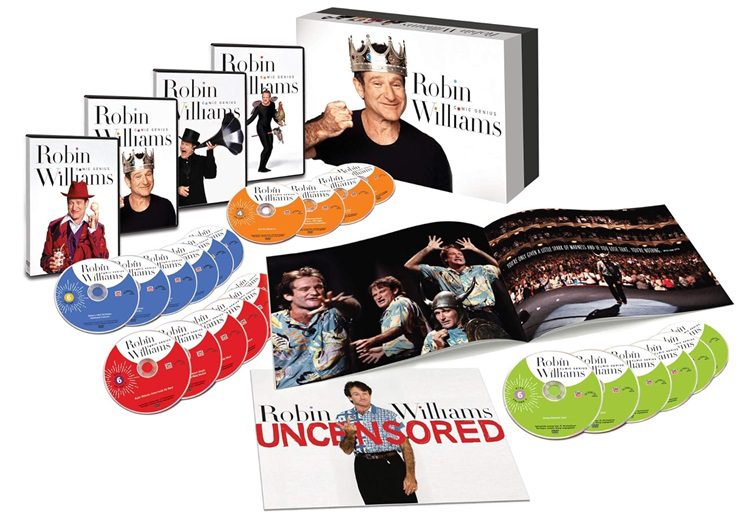
Robin Williams: Comic Genius scours the video vaults of Hollywood and beyond to present a comprehensive look at Williams’s television work, over 52 hours across 22 discs.
Volume 1 (six DVDs) has a primary focus on his HBO stand-up comedy specials. Covering more than 30 years, they are HBO On Location: Robin Williams – Off the Wall (1978); An Evening with Robin Williams (1983); Robin Williams: An Evening at the Met (1986); Robin Williams: Live on Broadway (2002), the audio of which earned him a Grammy; and Robin Williams: Weapons of Self Destruction (2009). Disc 6 covers Williams’s USO tours in 2004 and 2007.
Volume 2 (six DVDs) opens with six episodes from the first season of Mork and Mindy. Viewers also get three edited Saturday Night Live episodes from the ’80s, The Oprah Winfrey Show from 1991, four appearances on The Tonight Show with Jay Leno, and his memorable interview on Inside the Actors Studio. The volume concludes with the insightful documentary, Robin Williams: Come Inside My Mind.
Volume 3 (six DVDs) is similar to Volume 2. There are five episodes from the third season of Mork and Mindy, three appearances on The Tonight Show Starring Johnny Carson, and eight appearances on Jimmy Kimmel Live! Funny Numbers with Steve Martin is a discussion with Martin and mathematician Robert Osserman. Williams is in audience and joins them on stage at 37 minutes in. There is also time spent talking with comedian David Steinberg and a couple sketches from when he guest starred on SCTV Network in 1982.
Volume 4 (four DVDs) opens with three appearances on Charlie Rose. Disc 2 has highlights of Williams on UK chat shows including a pair from The Graham Norton Show, Dame Edna’s Hollywood, and Parkinson. Disc 3 finds Williams paying tribute to three men he’s worked with on the AFI Life Achievement Award between 2003 and 2010 and to films he loved and his own like Good Morning, Vietnam and Mrs. Doubtfire on AFI’s 100 Years…100 Laughs.
The final disc in the collection presents numerous award shows that Williams either presented or won, such as The Academy Awards (three), The American Comedy Awards (two), The Golden Globe Awards (five), and The Kennedy Center Mark Twain Prize for American Humor (four). Interesting to hear his manager David Steinberg say Williams turned down the Mark Twain Prize more than once. The collection concludes with Billy Crystal’s “Tribute to Robin” at The 66th Primetime Emmy Awards in 2014.
The extras include an amazing sampling of TV appearances. The earliest being a spot on The Second Annual HBO Young Comedians Show (1977) and the latest a 2013 Jimmy Kimmel Live!. There are celebrations of clubs, such as Catch a Rising Star and The Comedy Store. An All-Star Toast to the Improv is especially notable because some comics understandably don’t appreciate Williams interrupting their sets with his outbursts and they let him know it. There are also many interviews with manager Steinberg reminiscing about his time working with Williams throughout the collection. Additional interviews include Lewis Black, Pam Dawber, Oprah Winfrey, Jay Leno, Martin Short, and comedian David Steinberg.
Paraphrasing what I believe Jay Leno said in his interview and something with which is apparent after going through the set, Williams is much more a comic performer than a stand-up comic. He doesn’t have great material. Instead, it’s his quick improv skills, including interacting with the audience, and full-tilt commit to silliness. Anyone could recite George Carlin’s “Football and Baseball” and generate some laughs because the piece is a humorous, well-written piece. I can’t imagine anyone having the same type of success repeating Williams’s act.
And while there’s no doubt what a talented improviser he was, it was interesting while working though the set to see how often he repeated himself. Speaking in foreign-language gibberish, signing while someone else was talking, and asking how much the telethon had raised were common go-to gags. He had a great ear for dialects, and while never malicious, I wondered how his affectations when portraying African Americans and homosexuals would go over today. He was an interesting contrast to watch. He would use modern-day references but then kept doing an imitation of George Jessel this century that surely had an shrinking appeal with each passing day. His Jack Nicholson voice was so weak, it was surprising every time he brought it out.
I usually avoid discussing what a product isn’t, but with a collection so thorough, fans might want to know there’s nothing from Williams’s appearances on either David Letterman show, which is a shame because their longtime friendship from starting in the clubs together was so apparent. Nor is there anything from Comic Relief. Mork’s debut on Happy Days is not included and I would have preferred episodes from the fourth season of Mork and Mindy because his interaction with Jonathan Winters were a highlight of the entire series.
Robin Williams: Comic Genius certainly makes the case on why fans think so highly of him. To make clear how popular a figure Williams was, this collection also makes for a good overview of the past 40 years in television. For those on a budget, there is also a 12-disc set available that includes Volumes 1 and 2.